United Nations – Human Rights
Office of the High Commissioner
The World Conference on Human Rights took place in Vienna, Austria from 14-25 June 1993. A pivotal moment, the conference’s main outcome was the Vienna Declaration and Programme of Action, a common plan for the strengthening of human rights work around the world.
The conference also made concrete recommendations for strengthening and harmonising the monitoring capacity of the United Nations system. It called for the establishment of the post of the High Commissioner for Human Rights by the General Assembly, which subsequently created it on 20 December 1993.
Vienna Declaration and Programme of Action, June 25, 1993
On January 25, 1993, the new Secretary of State, Warren Christopher addressed the employees of the State Department. His message to the employees was that they were going to be formulating a new foreign policy for the United States given that the Cold War was over and the Soviet Union was no longer a threat. Interestingly, it seems like the people who were involved in foreign policy during the Carter Administration were brought back together under the Clinton Administration.
On July 21, 1993, Deputy Secretary of State, Tim Wirth announced a new Office of Global Affairs and a new mission for the State Department. The global initiatives that were the reason for the reorganization were:
- Democracy & Human Rights
- Population – reduction
- Environment
- Sustainable Development
The backdrop for this story is the end of the Cold War. The timeline from the UN High Commissioner for Human Rights:
1990 – General Assembly resolution 45/155 decided to convene the world conference on human rights and establish the Preparatory Committee
1991 – Commission on Human Rights resolution 1991/30 (in E/1191/22, p. 78) made recommendations to human rights mechanisms and the Preparatory Committee
1991-1993 – The Preparatory Committee for the World Conference on Human Rights held 4 sessions from 1991 to 1993.
1992 President George Bush signed the International Covenant on Civil and Political Rights (ICCPR). (1966 UN adopted the ICCPR. 1977, Jimmy Carter sent it to the Senate for Advise and Consent, April 1992, the Senate gave consent and April 1992, George Bush signed it.) Source: Carter Center Website, article by Jimmy Carter.
Cliff Wharton – Pension Fund
———————————–
“Mr. President, in keeping with the general view that foreign aid must be reexamined and restructured to meet the changing challenges of the world, the Clinton administration has created a task force headed by Deputy Secretary of State Clifford Wharton. It is my understanding that the task force will soon make recommendations to re-organize foreign aid” – Congressional Record, May 24, 1993, Pages 10859-10861, Senate Concurrent Resolution 26 Relative to Global Hunger
What becomes clear listening to Warren Christopher, Tim Wirth and Madeleine Albright was that the new policy of the State Department was going to serve the United Nations. In no way was it a foreign policy for the United States and the American people – quite the opposite in fact. The bullet points for the new policy were:
Internationalization – State Department effectively becomes an agency of the United Nations – working to strengthen the UN – betraying the American people.
Localization of global affairs – nation state diplomacy replaced by missionaries for sustainable development – translated to be on-the-ground meddlers in the affairs of other nation-states and outside their bailiwick as it pertains to operations within the borders of the U.S.
Population reduction for the third world and consumption reduction for the first world – in other words, economic warfare on the American people.
In the remarks of Tim Wirth to State Department employees, he mentioned the Carnegie Report on the transition of the presidency. That report references the Global Development Report which corresponds to the new post Cold War agenda hinted at by Christopher, Wirth and Albright and as confirmed by history.
Localization of Global Affairs
May 24, 1993 – S.Con.Res 26 – Sponsored by Sen. Paul Simon
Section 1. Short Title.
This resolution may be cited as the “Many Neighbors, One Earth Resolution.
Section 2. Sustainable Development Policy and Program of Action
(a) In General — The President is urged to develop and implement a coordinated economic and development policy and program of action designed to promote broad-based, sustainable development.
Carnegie Commission on Science and Technology, Presidential Transition Report and Global Development Report both published in 1992.
Tim Wirth also mentioned the Global 2000 report. This report was produced during Jimmy Carter’s Administration. It’s actually two volumes but the second volume is all statistics.
In 1993, Gerald O. Barney who was the Director of the Global 2000 project during the Carter Administration, published an updated version of the Global 2000 report:
In the year 2000, the San Francisco Chronicle published an editorial by Barney. The article reveals the religious beliefs behind the report and the project.
A related report also produced by Gerald O. Barney published in 1977, funded by the Rockefeller Brothers Fund is The Unfinished Agenda.
Warren Christopher had been the Deputy Secretary of State under the Carter Administration. He was appointed by Bill Clinton to be the Secretary of State during his Administration.
It was during the Carter Administration that the directive was given to the State Department to produce and present the global human rights report annually to Congress. Warren Christopher as Deputy Secretary of State produced the first report.
Bill Clinton appointed Warren Christopher to be his Secretary of State. The global initiatives that Tim Wirth spoke about in his remarks to the State Department employees listed above correspond to the United Nations Vienna Declaration and to the President’s Council on Sustainable Development (PCSD). Tim Wirth was appointed to be a member of the PCSD.
Blueprint for the Reinvention of Government
PCSD Members and Task Forces
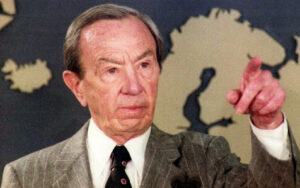
Trade and Aid
“Good Partners in the Development Process”
State Department legislation, S.1856 – Peace, Prosperity, and Democracy Act of 1994
S.Con.Res.26, May 24, 1993
Urging the President to redirect United States foreign assistance policies and spending priorities toward promoting sustainable development, which reduces global hunger and poverty, protects the environment, and promotes democracy.
Whereas the easing of Cold War tensions requires a reassessment of United States foreign assistance objectives, programs, and spending priorities, and presents a unique opportunity to shift the emphasis from military and security-related priorities to addressing the urgent and interrelated problems of poverty and environmental destruction;
Whereas nongovernmental organizations, both in the United States and in developing countries, are often highly qualified actors in promoting grassroots development, strengthening civil society, and providing humanitarian assistance;
Whereas since the mid-1980s, resources have begun to shift within the foreign assistance budget toward increased expenditures for humanitarian and sustainable development programs: Now, therefore, be it (resolved . . . )
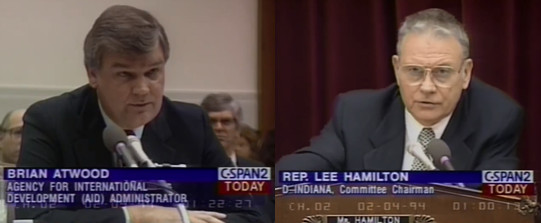 Foreign Assistance Hearing – Lee Hamilton presiding,
Foreign Assistance Hearing – Lee Hamilton presiding,
February 4, 1994
Globalizing
the Great Society
Crooks United
to loot the world


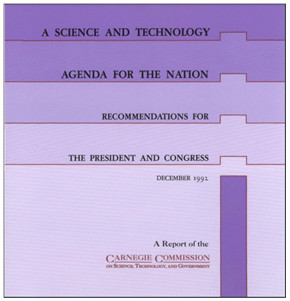
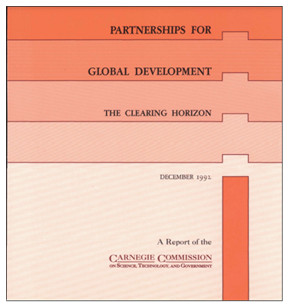
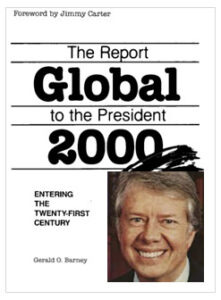
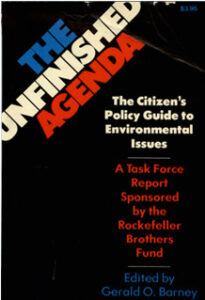




5 Comments
Kristin
Hi VIcky- they hide these economic initiatives in innocuously boring plans (like in Education Reform initiatives, namely Tough Choices or Tough Times) so the public won’t see inside workings. I was just looking up Tough Choices – remember that? The pyramid graph? “Work” , which is the biggest chunk at the bottom of the pyramid to go to slaves, and US (1st world) at the top) to focus on Research and Development? Basically turning USA into 7th century Chad, or Eritrea. We shall be like those nomad Turks in year 600, the “advanced” populations to lounge around reading books in an IQ utopia. Look at Turkey or Chad or Saudi Arabia today but we don’t have their oil…. USA to be void of industry that is and guess who gets the industry, China. China being a Communist state any big profits must go back to the State which means their military. Actually they won’t even need a military, this can all be done economically. I think the fear-mongers are looking for the thief in the night, when actually it’s the “grocery boy” who brings destruction I think.
Vicky
I do remember that report. In fact, I wrote an article about it.
http://www.channelingreality.com/UN/Education/D_Day_in_america.htm
The problem with their conception of how the world would work – won’t work. I like to use the analogy of the pampered pussy cat and the feral cat who lives on the streets in the real world. The idea of Tough Choices – keeping Research and Development here while exporting the actual production of the ideas – is that innovation comes from the doing – not the thinking. Their idea is analogous to the pampered pussy doing the thinking work while the feral cat gets their hands dirty doing the actual work. Why would they do that? Because the intellectuals who designed our economy are pampered pussy cats. They have no idea about the real world and how things work in the real world.
China already won the economic war because they were aided and abetted by intellectual traitors (pampered pussys) in our country. I think you are right but instead of the grocery delivery boy, I’d say it was the janitors who clean the buildings at night.
Vicky
Kristin,
Listen to this. It supports my analogy of the pampered pussys and the feral cats.
https://www.youtube.com/watch?v=v2NftKNm1hU
Kristin
Vicky I disagree with you completely on the elites being oblivious to actual real work, working persons and so on. I think they know perfectly well but they don’t like thinking about it, not unlike a soldier who must de-humanize his target in his mind before he can eliminate that target. Dark browns are automatically lower classes which see Ocasio-Cortez famous ghetto-speech recent history of her addressing the Democrat black business women: “ain’t no shame in foldin’ clothes..” wasn’t that what she said? OK why would she, and all those like her, assume this group of black voters were a bunch of washer-women? that’s what bothered me, and if any media outlet mentioned that anywhere and not just about her fake new black accent tried on for that event, I’d like to see it. Black does not equate “manual laborer” but it does in these people’s minds. They’re not racist because they say they’re not, but people like Pres. Trump are racists. I don’t get it, it’s not fair. Today is Juneteenth apparently, I am in AZ it’s now a holiday here, no work for husband we get to stay in, but Juneteenth is a TEXAS holiday and I remember it fondly it was special only to Texans so I thought but now it’s global and a holiday ! today, husband didn’t have to come in to work, well that’s BS because I can’t even find Big Red soda in my area. Big Red is a great drink number one, it’s my favorite soda, but it’s the official yes official drink of Juneteenth. ‘God bless’ to you Vicky, (Kristin in AZ)
Vicky
I guess I didn’t make myself clear. It’s not that they don’t understand the attributes of a job. Every type of job in the country has been documented along with the requirements of the job. What they don’t understand – and can’t ever understand is how the lower socio-economic classes navigate within the world of work and the society around them. There is no humanity in statistical reports.
I didn’t hear Cortez give that speech. I don’t know if she was deliberately being insulting or if she is just such a narcissist it didn’t occur to her that it would be insulting. She’s not a politician. She’s an actress. Obviously when she is writing her own script, she screws up because she’s a dim bulb.
They made Juneteenth a national holiday. That’s why your husband didn’t have to work.